The Great Wall of Hungary
Adelina Marini, September 16, 2015
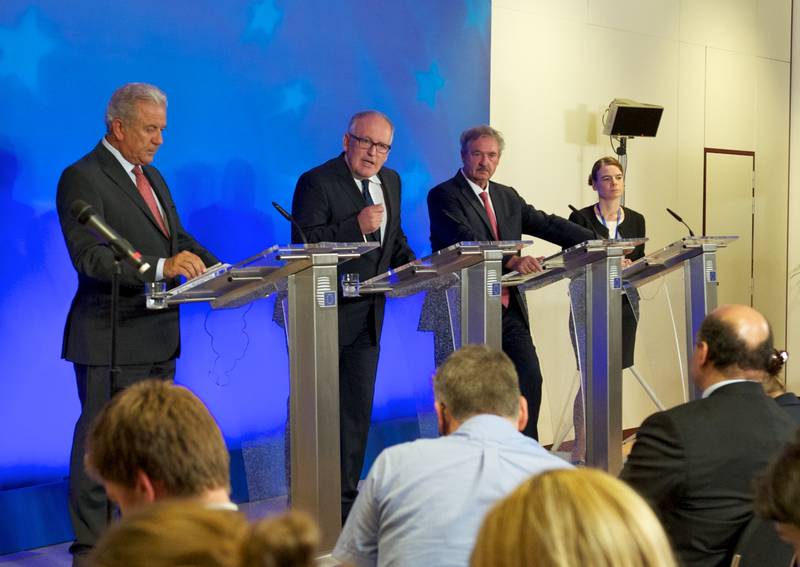 The Great Wall of China was built in the 7th century BC to protect the empire from the nomadic tribes’ raids. It is one of the seven wonders of the world. Soon the European Union will have its first Great Wall of Hungary which will quite possibly go down in history as the reason for the disintegration of the EU. After finishing the setup of the 4 meter high wire fence at the border with Serbia the Hungarian government decided that today (September 15th), it will start preparations for building an identical one along its border with Romania to protect itself from any possible rerouting of the refugees’ “raids” into the EU. Minister of Foreign Affairs and Trade Péter Szijjártó said after a government meeting that at the moment it is all just preparation work, for which the Romanian foreign ministry had been notified. Moreover, starting 15 September, the Hungarian government is instituting much stricter measures for dealing with the refugee flow, which spurred outrage all over the European Union, but are actually legally sound.
The Great Wall of China was built in the 7th century BC to protect the empire from the nomadic tribes’ raids. It is one of the seven wonders of the world. Soon the European Union will have its first Great Wall of Hungary which will quite possibly go down in history as the reason for the disintegration of the EU. After finishing the setup of the 4 meter high wire fence at the border with Serbia the Hungarian government decided that today (September 15th), it will start preparations for building an identical one along its border with Romania to protect itself from any possible rerouting of the refugees’ “raids” into the EU. Minister of Foreign Affairs and Trade Péter Szijjártó said after a government meeting that at the moment it is all just preparation work, for which the Romanian foreign ministry had been notified. Moreover, starting 15 September, the Hungarian government is instituting much stricter measures for dealing with the refugee flow, which spurred outrage all over the European Union, but are actually legally sound.
The long awaited but totally fruitless emergency meeting of EU foreign ministers of Monday ended controversially. At the late press conference after the meeting in Brussels, the Minister for Immigration and Asylum of Luxembourg, who at the moment holds the rotating Presidency of the Council of the EU, First Vice-President of the EC Frans Timmermans, and Commissioner for Migration, Home Affairs and Citizenship Dimitris Avramopoulos looked disappointed, even angry. In the words of Jean Asselborn the Council of interior ministers was extremely difficult. He started by saying that late night meetings sometimes end with Council conclusions, and then sometimes, like on Monday evening, they end with Presidency conclusions. This means that the published document does not possess the legal power of Council conclusions, i.e. it is not a legislative document.
Conclusions of the Presidency give general directions as to how negotiations went and often many member states disagree with them. The document also contains real solutions. The Council confirmed its decision to approve the first EC proposal for distribution of less than 40 thousand refugees. This proposal was made in May, and the ministers of internal affairs and justice approved it at end-July. Considering the second proposal of the EC of September 9th, the Council has reached an agreement in principle for the redistribution of another 120 thousand people from affected member states. The EC proposal includes Italy, Greece, and Hungary, but in the Presidency conclusions it says that this proposal has to affect all countries exposed to mass migratory flows.
It is expressly said that the mechanism for redistribution should not be mandatory but voluntary, and that the flexibility that some member states need in adhering to this decision must be taken into account.
Starting Tuesday, the Hungarian government instituted new rules, according to which anyone looking for an asylum at the Serbian border will automatically be rejected. Anyone who manages to sneak in is going to prison. Hungary is referring to its list of safe countries of origin. A spokesperson for the Hungarian government explained that in the future anyone who has not filed an asylum request in Serbia will be sent back. The EC’s proposal for such common list was approved in principle at the ministers’ meeting, but is yet to be enforced, so member states use their own lists if they have one. Last week, besides the common list the EC presented also the national lists and there was not a Hungarian one present. The common one describes the Western Balkan countries and Turkey as safe. Some states, however, disagree with Turkey being in that list because of its treatment of Kurds.
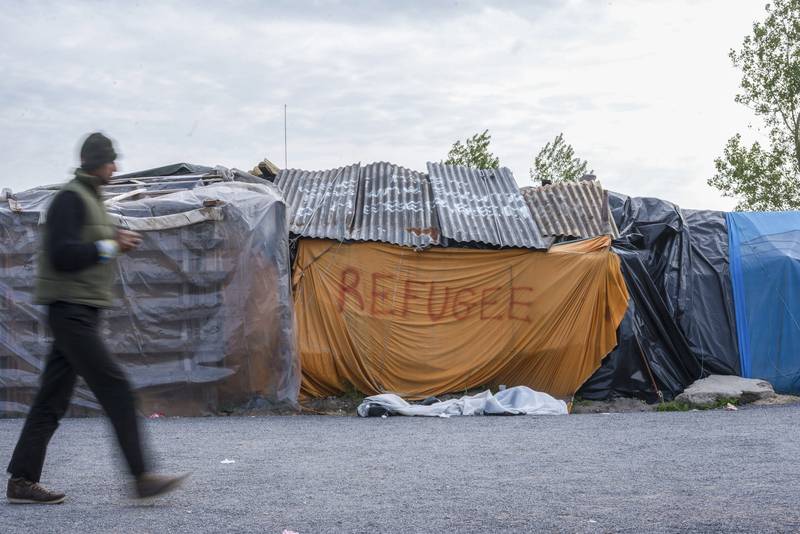 In the Presidency conclusions there could be found an explanation of Hungary’s behaviour. There, it is written that when voluntary return is not possible and the measures provided in the return directive are inadequate to the prevention of secondary movements there is a possibility to go to detention “effectively and without delay”. During the meeting on Monday, it was reminded how important it is to follow the readmission policies regarding refugees and an appeal was made for an immediate start of enforcement of these policies. In the Presidency conclusions, it says that the Council had adopted conclusions on the more effective implementation of the Schengen Information System for denial of entry and stay of illegal migrants. Countries outside the EU must accept back their nationals who are not allowed to remain in the EU. An agreement was reached that when all requirements of the Directive on granting international protection are met, especially the guarantee that no person shall be sent back to their country if there is in danger of persecution, then member states can enforce the rules, pertaining to safe countries.
In the Presidency conclusions there could be found an explanation of Hungary’s behaviour. There, it is written that when voluntary return is not possible and the measures provided in the return directive are inadequate to the prevention of secondary movements there is a possibility to go to detention “effectively and without delay”. During the meeting on Monday, it was reminded how important it is to follow the readmission policies regarding refugees and an appeal was made for an immediate start of enforcement of these policies. In the Presidency conclusions, it says that the Council had adopted conclusions on the more effective implementation of the Schengen Information System for denial of entry and stay of illegal migrants. Countries outside the EU must accept back their nationals who are not allowed to remain in the EU. An agreement was reached that when all requirements of the Directive on granting international protection are met, especially the guarantee that no person shall be sent back to their country if there is in danger of persecution, then member states can enforce the rules, pertaining to safe countries.
Article 33 of the directive is expressly mentioned, for it grants a possibility to member states to refuse to accept candidates for international protection if they have already been granted such in another member state or non-member that is considered a safe state. This is exactly the article that justifies Hungary sending refugees back to Serbia without processing their documents. Serbian Minister of Foreign Affairs Ivica Dačić said, quoted by Reuters, that Hungary’s decision is unacceptable, for it creates problems for Serbia. He added that talks with the EU and individual member states are coming up in the next days. In October, there will be a special high-level conference on the Western Balkans refugee route at which most probably will participate the ministers of internal and foreign affairs of the Western Balkans countries and some member states. It is not yet clear when or where this conference is taking place, nor which countries are participating.
The ministers also agreed to release additional aid to the affected countries of the Western Balkans, so that they can deal with managing their borders, accepting and processing migrants, grant international protection, etc. Available funds from the programmes for the countries in the enlargement process will be used for this purpose. Special financial mechanisms for aiding those states are yet to be discussed. Hungary has another “trump card”. The EU has a signed readmission agreement with Serbia, which gives grounds to it to readmit not only its own citizens, who are not allowed to stay in the EU, but also citizens of third countries. Returns could happen after a filed 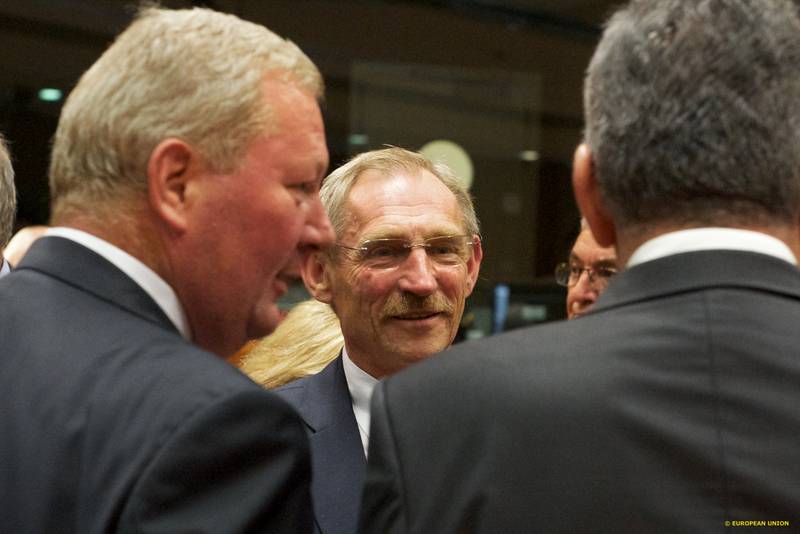 request, but could also happen without one if the refugee has any valid identification, visa, or residence permit, issued by the requesting state.
request, but could also happen without one if the refugee has any valid identification, visa, or residence permit, issued by the requesting state.
UNHCR spokesman in Hungary Erno Simon stated that the country's actions along the border were troubling and he was particularly worried about returning the refugees to Serbia. Hungary’s actions were also criticised by Croatian MEP Tonino Picula (Socialists and Democrats), former foreign minister of Croatia. He feels the fact that in answer to Hungarian actions Serbia was considering stationing army units at the border with Hungary in order to prevent the return of refugees is very risky.
He warned, during a hearing in the EP foreign affairs committee with the participation of High Representative of the European Union for Foreign Affairs and Security Policy Federica Mogherini and Commissioner Avramopoulos, that additional problems might arise from the bad combination of a refugee crisis and parliamentary elections that are to be held soon in many of the transit countries. The chair of the European Parliament's Committee responsible for migration and asylum Claude Moraes (Great Britain, Socialists and Democrats) sharply criticised the results of the meeting of ministers on September 14th. He feels member states have once again failed in making difficult decisions and in presenting an adequate response to the refugee crisis.
Tension in the Council continues to run mainly along the East-West axis. Central European countries have stated even before the meeting that there would be no change in their current positions. Slovakia Minister of Internal Affairs Robert Kaliňák stated that the quota system was no solution and the situation was such that it is not only Greece and Italy that need help, but Austria and Germany as well. He thinks the problem has transferred from Greece to Germany. His Dutch colleague Klaas Dijkhoff expressed his concern by Germany’s decision to temporarily reinstate border control at its border with Austria because, in his words, this could reroute migrants towards the Netherlands, where there is considerable pressure already.
Swedish Interior Minister Morgan Johansson was outraged by some countries’ individual actions. “I don't like when countries are trying to scare people off,” he said and added that it cannot be just one or two countries taking the entire burden. After the meeting on Monday, Germany further hardened the tone by proposing that European funds be stopped for Eastern European countries as a compensation for their refusal to participate in the refugee distribution scheme. This was met at an edge by Slovakia and the Czech Republic. According to Czech Prime Minister, this would be completely illegal which was confirmed by the EC today. Slovakia, in turn, warned that this would mean the end of the EU. In the EC’s proposal, there are words of compensations being paid by the states that do not wish to participate in the scheme. It is about contributions to the European budget of 0.002% of GDP. After the meeting on 14 September, Jean-Claude Juncker’s right hand man Frans Timmermans was literally scolding the member states for their failure to show unity.
The strongest speech of the last few weeks, however, is Federica Mogherini’s of last Wednesday. Immediately after Juncker’s State of the Union address in Strasbourg she faced MEPs to defend the EC proposal. “Frans (Timmermans) said it very well: this is a defining moment, a defining moment for our Union. Words are important, and the refugee crisis we are facing puts our deepest values – even our identity – to the test. It is a moment of truth: it will show if we really are European, and if we really are a Union. That's it. Our responsibility to protect human life and human rights. Solidarity, among Member States and towards those who are most in need. But this is also a test for our international credibility. Don’t think we can sponsor human rights around the world if we don’t guarantee the highest asylum standards inside our Union. Don’t think or don’t even imagine that we can promote cooperation among parties that are at war at this moment, if we don’t accept “the other” inside our own communities and if we don’t manage to find unity 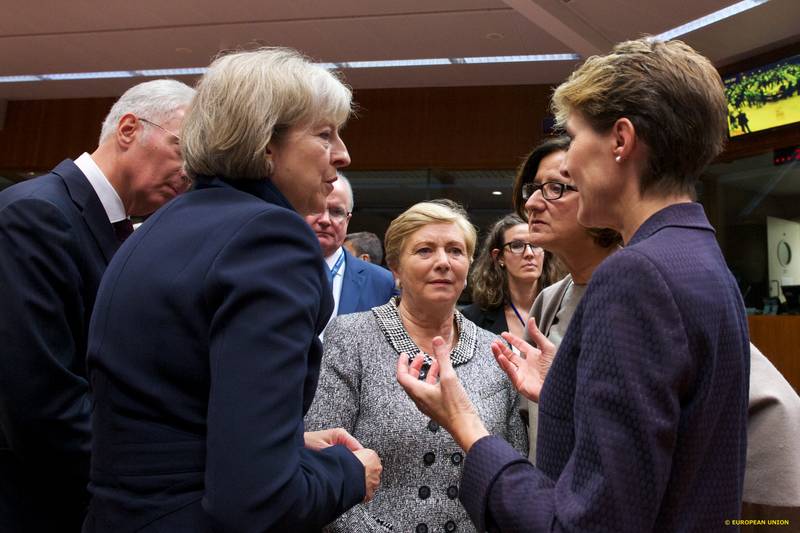 among ourselves. To be credible, preaching well is not enough. We must act well, we must act fast, and we must act united”, she said.
among ourselves. To be credible, preaching well is not enough. We must act well, we must act fast, and we must act united”, she said.
Lack of unity is being felt at more and more levels. One of them is the guarding of the outside borders of the Union, which lies entirely in member states’ competences. In his analysis of the state of the Union Jean-Claude Juncker announced that by the end of the year proposals will be presented for the reinforcement of the European border agency Frontex. This was applauded by ministers of internal affairs, who are also calling for urgent deployment of Frontex teams for rapid intervention at the most-sensitive external borders after consultations with the affected member states. Back in 2011, however, ironically during the Hungarian presidency of the Council, a more unified approach to guarding the outside borders was discussed and was met with hostility by the member states.
Back then this website wrote: "On the one hand everyone is unanimous that EU external borders are a common problem, but on the other - there are weaknesses in some countries that harm others. And the even bigger problem is that, in spite of the decades long efforts to achieve economic convergence in the European Union, it is still not a fact, which makes some EU countries more attractive for immigration to others.” Dimitris Avramopoulos attempted to assure the public on Monday that nothing that bad happened at the meeting. “This is how the European Union works”, he said. Today we have no success, but tomorrow we will have it, he ensured. The next meeting of the ministers of home affairs will be on October 8-9. The topic will be a central one in the agenda of the October EU summit on 15-16 October.
Translated by Stanimir Stoev
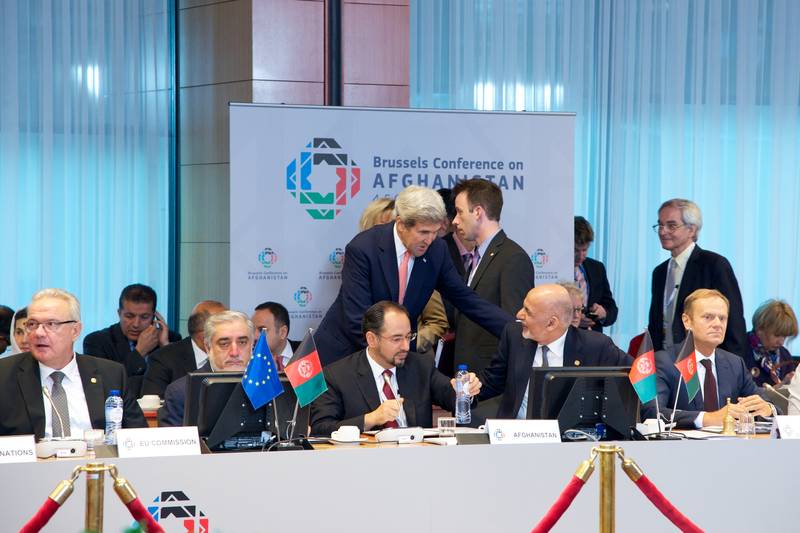 | © Council of the EU
| © Council of the EU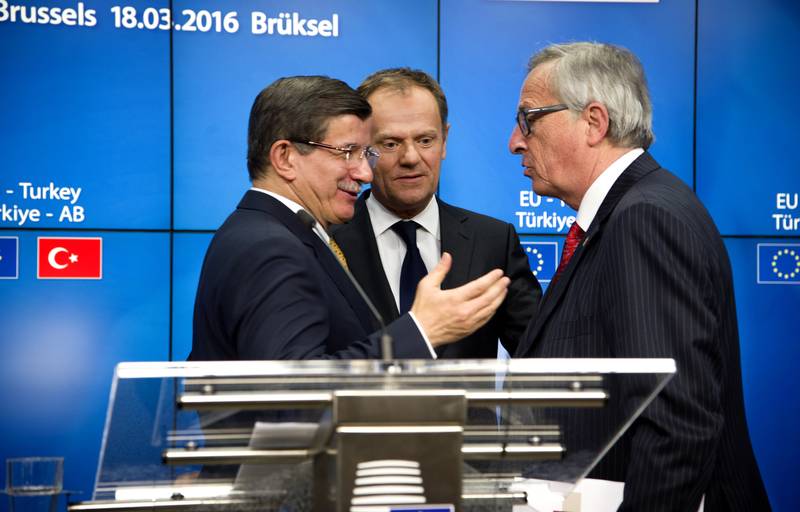 Davutoglu, Tusk, Juncker | © Council of the EU
Davutoglu, Tusk, Juncker | © Council of the EU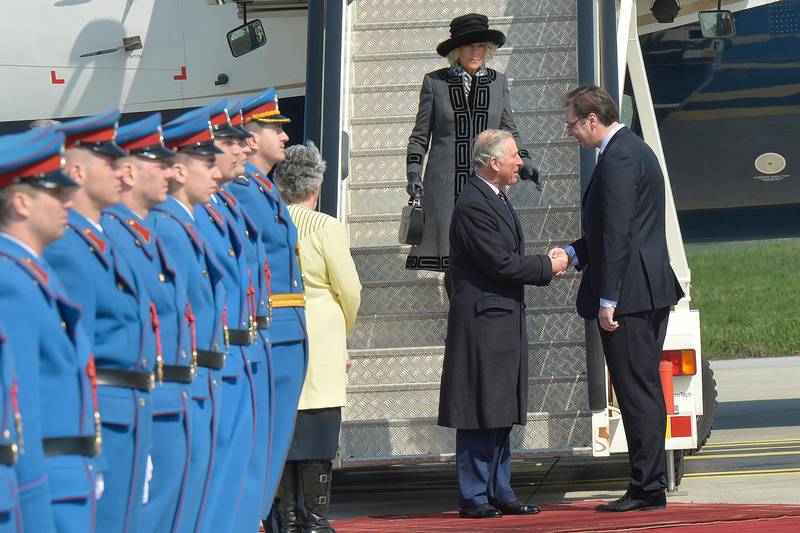 | © Vlada RS
| © Vlada RS